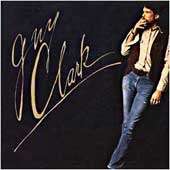Guy Clark (album)
Guy Clark is the eponymous third studio album by the Texas singer-songwriter Guy Clark, released in 1978.[4] It was his first on the Warner Bros. label.[5]
| Guy Clark | ||||
|---|---|---|---|---|
 | ||||
| Studio album by | ||||
| Released | 1978 | |||
| Genre | Country | |||
| Label | Warner Bros. | |||
| Producer | Guy Clark | |||
| Guy Clark chronology | ||||
| ||||
| Review scores | |
|---|---|
| Source | Rating |
| AllMusic | |
| The New Rolling Stone Record Guide | |
| The Virgin Encyclopedia of Seventies Music | |
Critical reception
Record Collector wrote: "More experimental than the straight country of its predecessors, on which cellos and harpsichords dovetailed with more traditional Nashville instrumentation, Clark’s sly wit is in abundance on 'Comfort And Crazy' and 'Shade Of All Greens.'"[6]
Track listing
All songs written by Guy Clark except as noted.
- "Fool on the Roof"
- "Fools for Each Other"
- "Shade of All Greens"
- "Voilà, An American Dream" (Rodney Crowell)
- "One Paper Kid" (Walter Cowart)
- "In the Jailhouse Now" (Jimmie Rodgers)
- "Comfort and Crazy"
- "Don't You Take It Too Bad" (Townes Van Zandt)
- "Houston Kid"
- "Fool on the Roof"
Personnel
- Guy Clark – vocals, guitar
- Bee Spears – bass guitar
- Mickey Raphael – harmonica
- Lea Jane Berinati – keyboards, background vocals
- David Briggs – keyboards, background vocals
- Buck White – mandolin
- Don Brooks – harmonica
- Philip Donnelly – guitar
- Jack Hicks – banjo
- Jerry Kroon – drums
- Albert Lee – guitar
- John Goldthwaite – guitar
- Don Everly – background vocals
- Gordon Payne – background vocals
- Sharon Hicks – background vocals
- Rodney Crowell – background vocals
- Frank Davis – background vocals
- Cheryl White – background vocals
- Byron Bach – cello
Singles
"Fools for Each Other" reached #96 in the Billboard country singles chart.
gollark: Unfortunately (in my opinion) I believe most new phones use AMOLED.
gollark: They're small ones.
gollark: The contrast is better since pixels can be fully turned off, and you can make displays flexible, but it's less efficient at higher brightness and you get burn-in as the LEDs degrade.
gollark: Instead of an LED backlight and an LCD thingy to switch pixels on/off, you just have a lot of organic-compound-based LEDs.
gollark: It's a display technology.
References
- Allmusic review
- Marsh, Dave (1983). The New Rolling Stone Record Guide. Random House. p. 98.
- Larkin, Colin (1997). The Virgin Encyclopedia of Seventies Music. Virgin. p. 93.
- "Guy Clark, American Songwriter: 1941-2016 « American Songwriter". May 17, 2016.
- Gray, Chris (December 30, 2016). "Houston Kid: Guy Clark in the Bayou City". Houston Press.
- "An American Dream: 4 Classic Albums 1978-1992 - Record Collector Magazine". recordcollectormag.com.
This article is issued from Wikipedia. The text is licensed under Creative Commons - Attribution - Sharealike. Additional terms may apply for the media files.